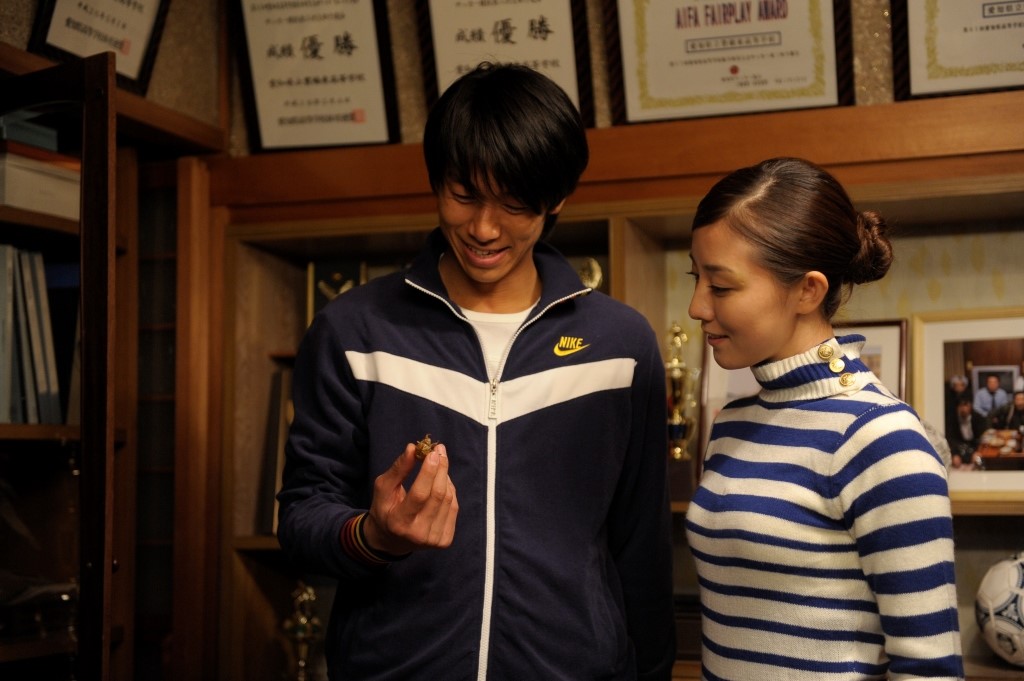An anomalous tearjerker from Sion Sono couched between some of the director’s most outré genre eruptions, Be Sure to Share channels Sono’s own grief over the loss of his father into a modest tale of filial piety renewed against the backdrop of terminal cancer. Shiro (Akira), who’s happily employed in his late twenties and on the cusp of engagement to his mild-mannered girlfriend, Yoko (Ayumi Itô), has his world rocked when his father Tetsuji (Eiji Okada) unexpectedly keels over and is rushed to the emergency room. When the diagnosis consigns Tetsuji to the hospital bed for what will likely be a permanent stay, Shiro, recognizing that his relationship with his dad extends scarcely beyond old-fashioned tough love, endeavors to deepen their connection before it’s too late. The premise is a melodramatic softball right over the middle of the plate, the kind of idea that Hollywood would hypothetically poach and transform into two hours of sad-macho life lessons handed down from an award-sniffing veteran actor to a handsome newcomer. And in certain respects, Sono makes that film: the title refers to a didactic sentiment sprinkled into the script three times in model screenwriting-manual fashion, the belatedly burgeoning father-son bond is fortified by not one but two props symbolizing their camaraderie, and it’s all accompanied by a heart-tugging score of strummed major chords. In other ways, however, Be Sure to Share is too emotionally naked, assembled as it is from the raw material of Sono’s own anguish, and too daring in its plunge into the depths of that anguish to scan as a schmaltzy copout, let alone a bankable commodity.
Channels Sono’s own grief over the loss of his father into a modest tale of filial piety renewed against the backdrop of terminal cancer.
Snags in the straightforward plot arise when Shiro receives personal news that instantly, as a script expert might say, “raises the stakes.” This new information, which Shiro strategically elects to keep to himself, magnifies the sense of urgency around his daily visits to his father’s bedside. And when, in one of Sono’s most experimental maneuvers, early scenes of seemingly innocuous conversation recur later in the film, they’re charged with new meaning in light of the knowledge we share with the protagonist. Suddenly, Shiro’s stammering and false starts register less as personality quirks than as the indications of an overwhelming inner turmoil. Further augmenting this turmoil are Shiro’s recurring daydreams of his father as a hard-ass high school soccer coach, memories that play like PTSD nerve shocks with their pumped-up saturation and space-warping camera angles. What’s especially peculiar about these scenes, aside from their general incongruousness against the rest of the film’s sedate naturalism, is that they’re lodged right into the middle of more openly sentimental montages, so that Tetsuji’s drill-sergeant hollering resounds over the same wistful acoustic guitar that scores tender exchanges between Shiro and Yoko. Sono’s point is that these respective emotional extremes are not isolated poles to be reconciled but rather inextricable dualities in the formation of identity and family ties. When Tetsuji exclaims that Shiro has “become a man,” is it a complement to receive with resentment or pride? Be Sure to Share’s conflicted portrait of machismo humbled before mortality is graced with a climactic act of desperation from Shiro, as moving as it is uncomfortable in expressing the irrationality of love, that leaves this question in a state of agonizing irresolution.







